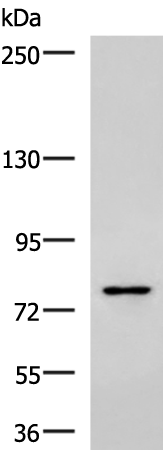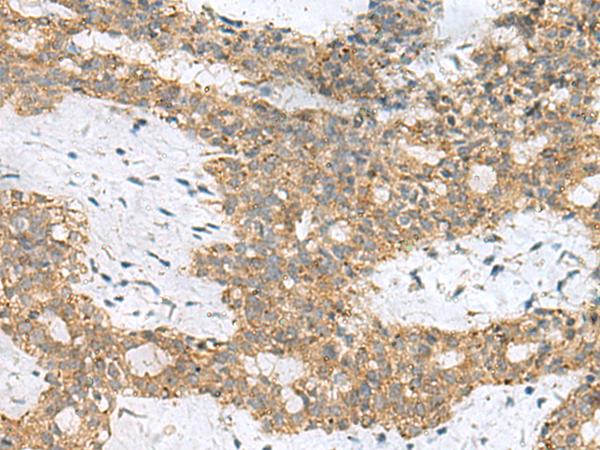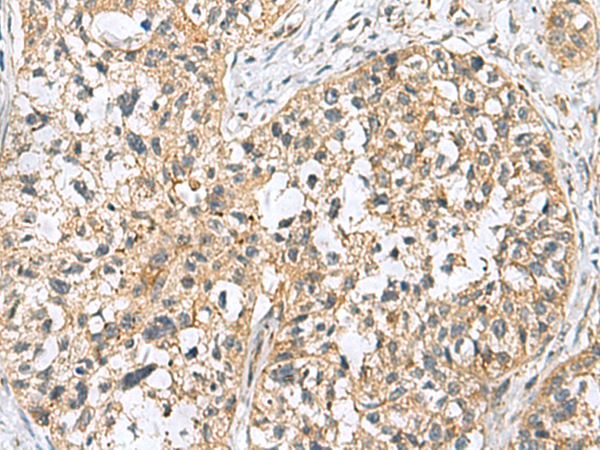


| WB | 咨询技术 | Human,Mouse,Rat |
| IF | 咨询技术 | Human,Mouse,Rat |
| IHC | 1/10-1/50 | Human,Mouse,Rat |
| ICC | 技术咨询 | Human,Mouse,Rat |
| FCM | 咨询技术 | Human,Mouse,Rat |
| Elisa | 1/5000-1/10000 | Human,Mouse,Rat |
| Aliases | SGS; SKV |
| WB Predicted band size | 80 kDa |
| Host/Isotype | Rabbit IgG |
| Antibody Type | Primary antibody |
| Storage | Store at 4°C short term. Aliquot and store at -20°C long term. Avoid freeze/thaw cycles. |
| Species Reactivity | Human, Mouse |
| Immunogen | Synthetic peptide of human SKI |
| Formulation | Purified antibody in PBS with 0.05% sodium azide and 50% glycerol. |
+ +
以下是3-4篇关于 **IFNGR1抗体** 的参考文献概览(信息基于公开文献摘要整理):
---
1. **文献名称**: *"A human IFNGR1 small deletion hotspot associated with dominant susceptibility to mycobacterial disease"*
**作者**: Jouanguy E, et al.
**摘要**: 研究报道了IFNGR1基因缺失突变导致受体蛋白表达异常,利用特异性抗体检测患者细胞表面IFNGR1表达缺失,揭示了该突变与遗传性分枝杆菌易感性的关联。
---
2. **文献名称**: *"Targeting IFN-γ receptor 1 with therapeutic antibodies in autoimmune diseases"*
**作者**: Murakami Y, et al.
**摘要**: 研究开发了靶向IFNGR1的单克隆抗体,通过阻断IFN-γ信号通路,在实验性自身免疫性脑脊髓炎(EAE)模型中显著减轻炎症反应,提示其治疗自身免疫疾病的潜力。
---
3. **文献名称**: *"Neutralizing anti-IFNGR1 antibodies modulate IFN-γ signaling and enhance bacterial clearance in tuberculosis models"*
**作者**: Cooper AM, et al.
**摘要**: 研究通过中和性IFNGR1抗体调节宿主免疫反应,在小鼠结核模型中观察到增强的细菌清除能力,提示抗体在感染性疾病中的双向调节作用。
---
4. **文献名称**: *"Functional characterization of IFNGR1 mutations in Mendelian susceptibility to mycobacterial disease"*
**作者**: Bustamante J, et al.
**摘要**: 利用IFNGR1特异性抗体结合流式细胞术,分析不同突变对受体表达和功能的影响,为遗传性免疫缺陷疾病的分子机制提供了实验依据。
---
**注**:如需具体文献全文或更详细引用信息,建议通过PubMed、Google Scholar等平台检索标题或作者名获取原文。
IFNGR1 (Interferon Gamma Receptor 1) is a critical component of the interferon gamma (IFN-γ) signaling pathway, which plays a central role in innate and adaptive immunity. As a cell surface receptor, IFNGR1 forms a heterodimeric complex with IFNGR2 to bind IFN-γ, initiating downstream JAK-STAT signaling cascades that regulate macrophage activation, antigen presentation, and pathogen clearance. Antibodies targeting IFNGR1 are essential tools for studying immune responses, particularly in infectious diseases, autoimmune disorders, and cancer immunotherapy research.
Monoclonal and polyclonal IFNGR1 antibodies are widely used to detect receptor expression via techniques like flow cytometry, immunohistochemistry, and Western blotting. They also help investigate receptor-ligand interactions, signal transduction mechanisms, and genetic mutations linked to immunodeficiency syndromes, such as Mendelian susceptibility to mycobacterial diseases (MSMD). Additionally, anti-IFNGR1 antibodies have therapeutic potential, either as blocking agents to modulate hyperactive immune responses or as diagnostic markers for diseases with dysregulated IFN-γ pathways. Their applications extend to preclinical models evaluating cytokine-mediated inflammation and tumor immune evasion mechanisms.
×